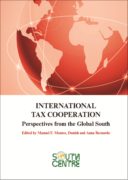Beijing+25 Update Series 6, 30 September 2020
Spotlight: Europe
Regional Round-up on progress in implementing the Beijing Platform for Action in light of the 25th anniversary of the platform
Spotlight: Europe
Regional Round-up on progress in implementing the Beijing Platform for Action in light of the 25th anniversary of the platform
South Centre Semester Report, 1 January to 30 June 2020
This Semester Report summarizes the activities undertaken by the South Centre during the period 1st January to 30 June 2020. It is intended to provide information, organized by themes, about recent developments in the areas covered by the Centre’s Work Program, meetings organized or co-organized by the Centre to examine particular issues or provide analytical support for negotiations taking place in various international fora, and conferences and other meetings where the Centre has participated. It also informs about publications made.
Spotlight: Latin America and the Caribbean
Regional Round-up on progress in implementing the Beijing Platform for Action in light of the upcoming 25th anniversary of the platform
Spotlight: Arab region and the Implementation of the Beijing Platform for Action
Regional Round-up on progress in implementing the Beijing Platform for Action in light of the upcoming 25th anniversary of the platform Spotlight: Arab region
Spotlight: Asia-Pacific and the Implementation of the Beijing Platform for Action
Regional Round-up on progress in implementing the Beijing Platform for Action in light of the upcoming 25th anniversary of the platform. Spotlight: Asia-Pacific
Spotlight: Africa and the Implementation of the Beijing Platform for Action
Regional Round-up on progress in implementing the Beijing Platform of Action in light of the upcoming 25th Anniversary of the platform. Spotlight: Africa.
Political Declaration on the occasion of the twenty-fifth anniversary of the Fourth World Conference on Women
Ministers and representatives of governments of the Member States of the United Nations met at a special one-day session of the 64th meeting of the Commission on the Status of Women (CSW64) and adopted a Political Declaration commemorating the 25th anniversary of the Fourth World Conference on Women, held in Beijing in 1995, and its major seminal output, the Beijing Declaration and Platform for Action (BD & BPfA).
International Tax Cooperation: Perspectives from the Global South
 About the Book:
About the Book:
A substantive reform of the global tax system involving a variety of multilateral platforms is underway. The question is not whether the tax standards and practices will change, but in which direction.
Developing countries have long sought changes in rules, standards and procedures shaping the allocation of taxing rights among sovereign states. In the wake of the 2008-2010 Great Recession, developed country governments engaged in massive public sector layoffs and channeling enormous public resources to bail out large financial companies and their wealthy investors. The Panama Papers, the Paradise Papers, the Lux Leaks became household words in the United States and Europe because of the journalistic coverage. Other scandals, such as the “cum/ex” fraud in Germany involving a loophole in the taxing of dividend receipts were less known but just as materially significant. Tax reform, particularly as it applied to the treatment of corporations working in multiple tax jurisdictions, thus became not only a problem of developing countries but an issue of global concern.
Collection of Resources on Climate Finance by the South Centre
This Collection contains various types of resources ranging from analytical & research papers, step-by-step guidance documents, short policy briefs, infographics, websites and digital tools dealing with the thematic area of climate finance that are all published after 2010. These resources are curated to support decision-makers and practitioners in finding, easily and in one place, practical resources to navigate the fast-changing and complex climate finance landscape. The resources focus specifically on International Climate Finance and multilateral financing mechanisms without going into detail on climate change & sectoral issues, national (public/private) climate financing and other financing mechanisms. For each resource, a short summary is provided to give the reader a snapshot of its content along with a link to access the full resource.
This update provides a snapshot of the activities of the South Centre during the month of September 2019.
Gender, Tax Reform and Taxation Cooperation Issues: Navigating Equity and Efficiency under Policy Constraints
By Dr. Mariama Williams
This policy brief has sought to present a review of the state of thinking and research on a pressing issue of the day: tax reform and tax cooperation and its gendered impacts. There is undeniably widespread agreement amongst all the entities of global governance with responsibility for a role in macroeconomic, financial and trade policies that gender equality and women’s empowerment are important to sustained growth and development. Increasingly, these same voices are articulating and researching on how fiscal policy both on the budgetary and on the revenue side can be made more efficient, gender sensitive and gender responsive. Taxation is the latest area of focused attention in this regard. There is now a quite strong body of work, including case studies, that demonstrates how the tax system can work to the disadvantage of socio-economic development and social goals including gender equality and women’s empowerment.
South Centre Quarterly Report, 1 April to 30 June 2019
This report summarizes the programmatic activities of the South Centre during the period 1st April to 30th June 2019. It is intended to provide information, organized by themes, about recent developments in the areas covered by the South Centre’s Work Program and publications made and meetings organized or co-organized by the Centre to examine particular issues or to provide analytical support for international negotiations taking place in various fora. It also informs about external conferences and other meetings where the Centre has participated.